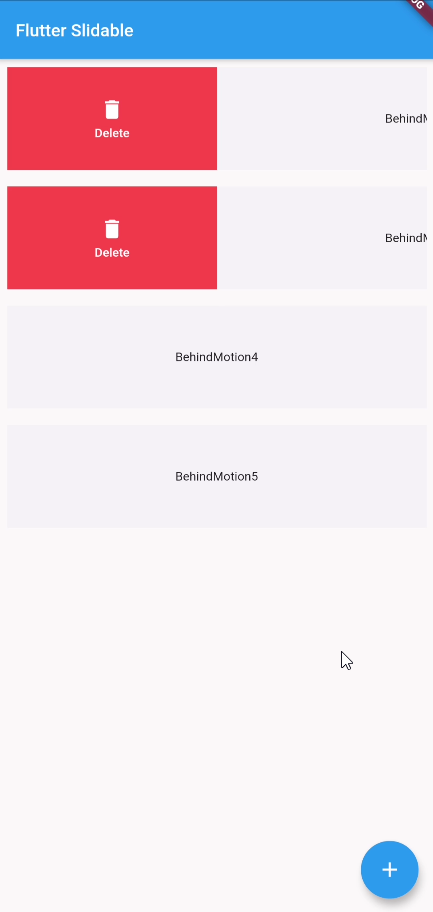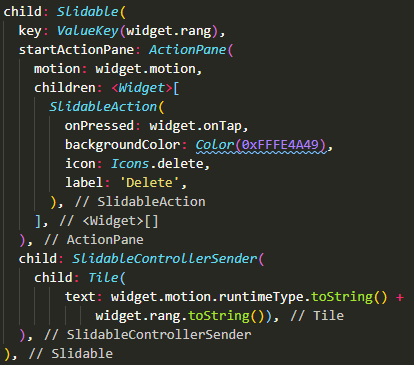Unexpected behavior when deleting Slidable from a list
I'm currently using flutter_slidable version 1.0.0-dev.8. From your example, I have built a dynamic list of Sidable that can be deleted. I'm not sure this is the expected behavior or if I need to do some more coding but when I delete one of the Slidable, all the other Slidable under it lost their state :
All the Slidable are dragged :

Then I delete one of them (third one in this case) :

The two first item kept their state and are still dragged but the two last aren't.
This is the code for the widget :
class MyHomePage extends StatefulWidget {
const MyHomePage({
Key key,
}) : super(key: key);
@override
_MyHomePageState createState() => _MyHomePageState();
}
class _MyHomePageState extends State<MyHomePage>
with SingleTickerProviderStateMixin {
AnimationController controller;
List<Item> listeItems = <Item>[];
int cpt = 5;
@override
void initState() {
super.initState();
listeItems.add(Item(rang: 1));
listeItems.add(Item(rang: 2));
listeItems.add(Item(rang: 3));
listeItems.add(Item(rang: 4));
controller = AnimationController(
vsync: this,
upperBound: 0.5,
duration: const Duration(milliseconds: 2000),
);
}
@override
Widget build(BuildContext context) {
return Scaffold(
appBar: AppBar(
title: const Text('Flutter Slidable'),
),
body: SlidablePlayer(
animation: controller,
child: ListView.builder(
itemBuilder: (context, index) {
final Item itemEnCours = listeItems[index];
return MySlidable(
key: ObjectKey(itemEnCours),
motion: const BehindMotion(),
rang: itemEnCours.rang,
onTap: (BuildContext context) {
listeItems.remove(itemEnCours);
setState(() {});
},
);
},
itemCount: listeItems.length,
),
),
floatingActionButton: FloatingActionButton(
onPressed: () {
listeItems.add(Item(rang: cpt++));
setState(() {});
},
child: const Icon(Icons.add),
),
);
}
}
MySlidable Widget :
class MySlidable extends StatelessWidget {
const MySlidable(
{Key key, @required this.motion, @required this.rang, this.onTap})
: super(key: key);
final Widget motion;
final void Function(BuildContext) onTap;
final int rang;
@override
Widget build(BuildContext context) {
return Padding(
padding: const EdgeInsets.all(8),
child: Slidable(
startActionPane: ActionPane(
motion: motion,
children: <Widget>[
SlidableAction(
onPressed: onTap,
backgroundColor: Color(0xFFFE4A49),
icon: Icons.delete,
label: 'Delete',
),
],
),
child: SlidableControllerSender(
child: Tile(text: motion.runtimeType.toString() + rang.toString()),
),
),
);
}
}
Item class :
class Item {
int rang;
Item({@required this.rang});
}
Thank you for your time.
You need to have a different keys for each Slidable otherwise you will have strange results. If your rang property is unique, you could use it with a ValueKey for example.
I tried it but it's not working either eventhough rang property is unique :

The result is the same as before.
Can you provide a sample code, I could run so that I can see what's going on?
Here is my full code
import 'package:flutter/material.dart';
import 'package:flutter_slidable/flutter_slidable.dart';
void main() {
runApp(MyApp());
}
const actions = [
SlideAction(
color: Color(0xFFFE4A49),
icon: Icons.delete,
label: 'Delete',
),
SlideAction(
color: Color(0xFF21B7CA),
icon: Icons.share,
label: 'Share',
),
];
class MyApp extends StatelessWidget {
@override
Widget build(BuildContext context) {
return MaterialApp(
title: 'Flutter Slidable',
theme: ThemeData(
primarySwatch: Colors.blue,
visualDensity: VisualDensity.adaptivePlatformDensity,
),
home: const MyHomePage(),
);
}
}
class MyHomePage extends StatefulWidget {
const MyHomePage({
Key key,
}) : super(key: key);
@override
_MyHomePageState createState() => _MyHomePageState();
}
class _MyHomePageState extends State<MyHomePage>
with SingleTickerProviderStateMixin {
AnimationController controller;
List<Item> listeItems = <Item>[];
int cpt = 5;
SlidableController controllerSlide;
@override
void initState() {
super.initState();
listeItems.add(Item(rang: 1));
listeItems.add(Item(rang: 2));
listeItems.add(Item(rang: 3));
listeItems.add(Item(rang: 4));
controller = AnimationController(
vsync: this,
upperBound: 0.5,
duration: const Duration(milliseconds: 2000),
);
}
@override
Widget build(BuildContext context) {
return Scaffold(
appBar: AppBar(
title: const Text('Flutter Slidable'),
),
body: SlidablePlayer(
animation: controller,
child: ListView.builder(
itemBuilder: (context, index) {
final Item itemEnCours = listeItems[index];
return MySlidable(
motion: const BehindMotion(),
rang: itemEnCours.rang,
onTap: (BuildContext context) {
listeItems.remove(itemEnCours);
setState(() {});
},
);
},
itemCount: listeItems.length,
),
),
floatingActionButton: FloatingActionButton(
onPressed: () {
listeItems.add(Item(rang: cpt++));
setState(() {});
},
child: const Icon(Icons.add),
),
);
}
}
class SlidablePlayer extends StatefulWidget {
const SlidablePlayer({
Key key,
@required this.animation,
@required this.child,
}) : super(key: key);
final Animation<double> animation;
final Widget child;
@override
_SlidablePlayerState createState() => _SlidablePlayerState();
static _SlidablePlayerState of(BuildContext context) {
return context.findAncestorStateOfType<_SlidablePlayerState>();
}
}
class _SlidablePlayerState extends State<SlidablePlayer> {
@override
Widget build(BuildContext context) {
return widget.child;
}
}
class MySlidable extends StatefulWidget {
const MySlidable(
{Key key, @required this.motion, @required this.rang, this.onTap})
: super(key: key);
final Widget motion;
final void Function(BuildContext) onTap;
final int rang;
@override
MySlidableSate createState() {
return MySlidableSate();
}
}
class MySlidableSate extends State<MySlidable> {
@override
void initState() {
super.initState();
}
@override
Widget build(BuildContext context) {
return Padding(
padding: const EdgeInsets.all(8),
child: Slidable(
key: ValueKey(widget.rang),
startActionPane: ActionPane(
motion: widget.motion,
children: <Widget>[
SlidableAction(
onPressed: widget.onTap,
backgroundColor: Color(0xFFFE4A49),
icon: Icons.delete,
label: 'Delete',
),
],
),
child: Tile(
text:
widget.motion.runtimeType.toString() + widget.rang.toString()),
),
);
}
}
class Tile extends StatelessWidget {
const Tile({
Key key,
this.color = const Color(0xFFF4F4F8),
@required this.text,
}) : super(key: key);
final Color color;
final String text;
@override
Widget build(BuildContext context) {
return Container(
color: color,
height: 100,
child: Center(child: Text(text)),
);
}
}
class Item {
int rang;
Item({@required this.rang});
}
class SlideAction extends StatelessWidget {
const SlideAction({
Key key,
@required this.color,
@required this.icon,
@required this.label,
this.onTap,
this.flex = 1,
}) : super(key: key);
final Color color;
final IconData icon;
final int flex;
final String label;
final void Function(BuildContext) onTap;
@override
Widget build(BuildContext context) {
return SlidableAction(
flex: flex,
backgroundColor: color,
foregroundColor: Colors.white,
onPressed: onTap,
icon: icon,
label: label,
);
}
}
Oh ok, this is not an issue of the package but you need to set the Key to key: ValueKey(itemEnCours), and also set the findChildIndexCallback of the ListView as is:
findChildIndexCallback: (key) {
if (key is ValueKey<Item>) {
return listeItems.indexOf(key.value);
}
},
This is explained in https://api.flutter.dev/flutter/widgets/ListView/ListView.builder.html:
The findChildIndexCallback corresponds to the SliverChildBuilderDelegate.findChildIndexCallback property. If null, a child widget may not map to its existing RenderObject when the order of children returned from the children builder changes. This may result in state-loss. This callback needs to be implemented if the order of the children may change at a later time.